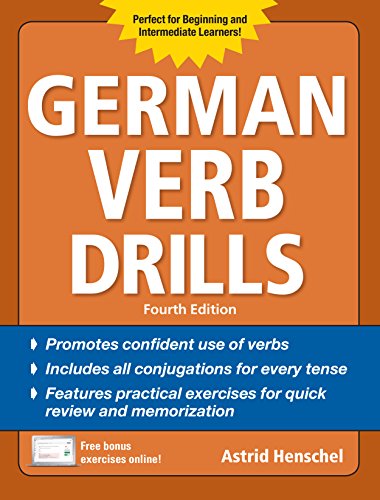

Most ebook files are in PDF format, so you can easily read them using various software such as Foxit Reader or directly on the Google Chrome browser.
Some ebook files are released by publishers in other formats such as .awz, .mobi, .epub, .fb2, etc. You may need to install specific software to read these formats on mobile/PC, such as Calibre.
Please read the tutorial at this link: https://ebookbell.com/faq
We offer FREE conversion to the popular formats you request; however, this may take some time. Therefore, right after payment, please email us, and we will try to provide the service as quickly as possible.
For some exceptional file formats or broken links (if any), please refrain from opening any disputes. Instead, email us first, and we will try to assist within a maximum of 6 hours.
EbookBell Team

4.1
90 reviewsGet the expert instruction you want and the practice you need with the conjugation of German verbs--with bonus online interactive exercises
German Verb Drills helps you overcome the obstacles of German verbs, so that you can confidently use verbs when expressing yourself in German. This book explains how the German verb system works, while providing numerous exercises for you to master each point covered.
Features:
Topics include: The Present Tense of Regular, Irregular, and Modal Verbs, Infin, sein, and werden, Present tense of irregular verbs, Verbs with separable prefixes in the present tense, Modal auxiliaries in the present tense, Imperative, Future Tense, and Present Perfect Tense, Imperative, Future tense, Present perfect tense of weak verbs, Haben or sein as the auxiliary verb in perfect tenses, Present perfect tense of strong verbs, Present perfect tense of mixed verbs, Present perfect tense with separable prefixes, Present perfect tense with inseparable prefixes and verbs stems ending in -ier, Present perfect tense with modal auxiliaries, The Past Tense, Use of past tense, Past tense of weak verbs, Past tense of strong verbs, Past tense of mixed verbs, Past tense of haben, sein, and werden, Past tense of modal auxiliaries, Perfect Tenses, Reflexive and Impersonal Verbs, Infinitive Constructions, and Passive Voice, Past perfect tense, Future perfect tense, Reflexive verbs, Impersonal verbs, Infinitive constructions, The passive voice, Formation of the subjunctive mood, Use of the subjunctive--expressing a wish, Subjunctive after als ob or als wenn, Conditional, Unreal conditions (subjunctive or conditional), Indirect discourse with the subjunctive and the indicative